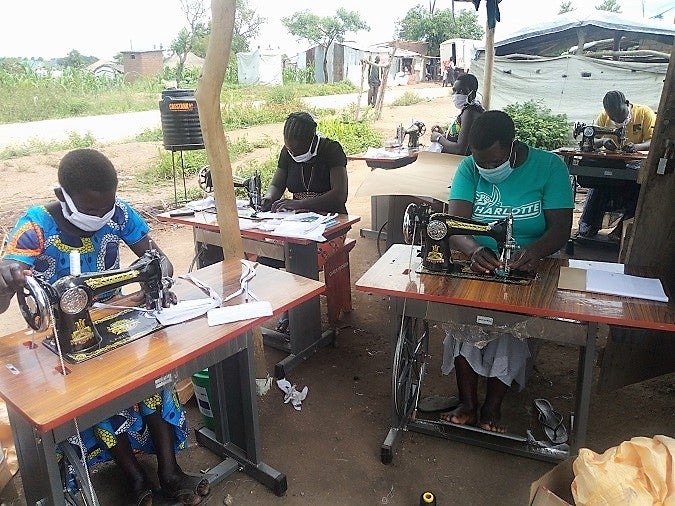COVID-19 response : UN Women Builds Economic Resilience of Women Living in Refugee Camps in Uganda
Date:

Members of Yenet Simsim Farmers’ Group in Zone 3, Village 12 Bidibidi Settlement receiving the farm materials in May 2020. Photo: CARE International / Betty Auma
Uganda has a cumulative total of 705 COVID-19 confirmed cases, and no related deaths. 4 cases of COVID-19 have been confirmed in refugee settlements. The refugee hosting districts are the worst affected in Uganda, as they border South Sudan, Democratic Republic of Congo and Tanzania and the risk of transmission is highest in border districts.
UN Women has been working with CARE International since October 2018 to implement the Leadership, Empowerment Access and Protection (LEAP) program in the South Sudanese emergency response. One of the outcomes of the LEAP is to promote positive coping mechanisms and sustainable economic activities for refugee women and girls in Adjumani and Yumbe Districts. The project uses Village Savings and Loan Association as a platform for access to financial resources, advocates for engendering of Cash for Work and Cash for Community Assets interventions, skilling of women, capitalization of women livelihoods groups and use of market engagement approaches that deliberately link excluded women to the markets. 6000 refugee women are targeted by this project.
At the time when the government announced a nationwide lockdown in March 2020, UN Women’s implementing partner, CARE International, had worked with 34 livelihood groups comprised of 977 women, to identify business enterprises and had trained over 1000 refugees and women from host communities on cash for work. CARE international has continued the support with startup capital for the livelihood groups during the COVID-19 pandemic.

Startup items which include agricultural tools like pangas, hoes, wheel barrows, slashes, watering cans, spray pumps and non-agricultural items like tailoring machines, grinding mills, and saloon items including construction material for the business premises have been distributed to the groups.
Speaking during the distribution of the items, Acidri Richard, the Office of Prime Minister (OPM) Community Services Assistant Bidibidi refugee settlement said “The Income Generating Activity (IGA) items package is so comprehensive that it will also help in prevention of COVID 19 among community members, since it comprises of hand washing facilities”. He urged the women to use the items productively to generate money and remain united to be able to achieve the objective of the livelihood enterprises.
OPM and the United Nations High Commission for Refugees (UNHCR) have supported access to land for refugee women to engage in agriculture. So far, 86 acres of land were recently allocated to 5 women groups in Bidibidi Settlement, to enable them to engage in farm activities and boost their livelihood activities in response to potential negative impacts of COVID-19 on household incomes.

Esther, the chairperson of God’s Mercy Group emphasized their commitment to work together saying “we have secured enough land and now that we have the planting materials we are going to start working immediately. As we want to be exemplary in Zone 1 and the ‘go to’ group when it comes to vegetable growing. We continue to work together as members, and we hope that these vegetables will provide us with what to eat and sell. The money from the sale of the vegetables will boost our group savings”.
“We are going to clear the land and plant Groundnuts. Our plan is to start a hotel as a group using the proceeds from the harvest”, added the chairperson of Moribongo Farmers group in Bidibidi Refugee settlement in Yumbe District comments, after the group received farm implements and planting materials in May 2020.
A total of 65 acres have so far been cleared and are ready for ploughing. The Yumbe and Adjumani District COVID-19 Task force teams have also been supported with fuel for coordination and hand washing facilities placed at Health Centers targeting women seeking Sexual Reproductive Health services at the centers. Hand washing facilities have been provided to the Women Livelihood and Village Savings & Loans Associations (VSLA) to enable them practice good hygiene and prevent the spread of COVID-19.